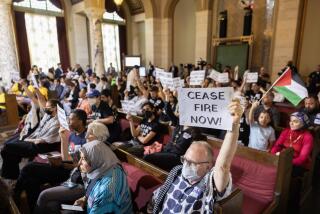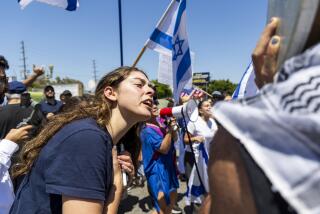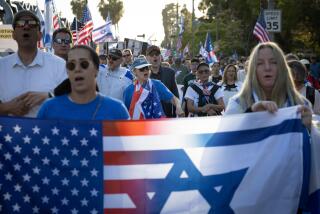New York mosque controversy worries Muslims overseas
- Share via
Reporting from Beirut — The heated debate across America over construction of the so-called ground zero mosque is reverberating across the globe, with the potential of creating a worldwide black eye for the United States.
Many Muslims abroad are miffed by the stateside debate, largely conducted by non-Muslims, that has grown so loud as to become a topic of discussion on talk shows and newspapers from Bali to Bahrain, from Baghdad to Berlin. The proposed Cordoba House has become a symbol of America’s fraught relations with the world’s 1.5 billion Muslims.
“Rejecting this has become like rejecting Islam itself,” said Ahmad Moussalli, a professor of Islamic Studies at the American University of Beirut. “The United States has historically been distinguished by its tolerance, whereas Europe, France, Belgium and Holland have been among those who have rejected the symbolism of Islam. Embracing it will be positively viewed in the Islamic world.”
Since the Sept. 11 attacks and the U.S.-led wars in Iraq and Afghanistan, America has spent millions trying to improve its image among Muslims, especially in the Arab world, from where the Sept. 11 hijackers and their leaders came. Coincidentally, the leader of the proposed Muslim community center, the Kuwaiti-born scholar Imam Feisal Abdul Rauf, is currently touring the Persian Gulf states on a U.S. State Department-funded trip to promote goodwill for America.
Like most non-Americans, Muslims across the world barely understand the vagaries of U.S. politics, including the wedge issues and posturing that turn midterm elections into mud fights. Commentators from the Middle East to South Asia to Indonesia to Nigeria praised Obama and New York Mayor Michael Bloomberg for coming to the defense of the community center, even as the president hedged his apparent initial support for the project.
Obama has “placed ethics and principles ahead of politics that not only enhances his credibility to the Muslims only but also his stature as a statesman to the rest of the world,” read an opinion piece in the Daily Star of Bangladesh.
But in interviews conducted mostly in the Arab world and in commentaries by newspapers throughout the Muslim world, many emphasized that the United States will be judged ultimately not on a building in Lower Manhattan but on whether it is able to help resolve the Israeli-Palestinian conflict and leave Iraq and Afghanistan in peace.
“Is not exerting serious effort to implement pledges towards the Palestinian cause and state more useful with regard to showing the U.S. adherence to rights, freedom and justice?” Rajih Khouri wrote in the Aug. 19 issue of An-Nahar, a Lebanese daily.
The proposed center, a sort of Muslim YMCA with a pool and a prayer room situated two blocks from the World Trade Center site, is not a huge topic of debate on websites that draw frenetic commentary over the Arab-Israeli conflict or tensions between Shiite and Sunni Muslims.
Houses of worship are humdrum affairs in the Muslim world and many ordinary Muslims wonder primarily whether the mosque is “needed,” meaning simply whether Muslims in that neighborhood now have nowhere else to pray. Some appear baffled that anyone in their right mind would scoff at a $100-million private-sector investment at a time of global economic crisis.
“To me and many Muslims, this mosque is like any other mosque in any part of the world,” said Houriya Baleegh, a 55-year-old Cairo housewife. “It does not mean much to Islam having a mosque at ground zero.”
Indeed, some say it’s a bad idea to construct the building so close to the site of the twin towers, whose fiery destruction at the hands of 19 Muslim extremists is etched into the minds of people all over the world.
“Building a mosque there will increase hatred between Muslims and non-Muslims in the West,” said Gamal Awad, a professor at Cairo’s Al Azhar University. “It will further connect Islam with a horrible event.”
But many Muslims tuning in to the debate see a demonization of their religion by some Americans, who have been painting the 1,400-year-old faith as a dangerous political ideology. They bristle at the ignorance of politicians who argue that the structure should not be allowed because Muslims don’t allow churches in their countries. Despite tensions between Christians and Muslims in some countries, Saudi Arabia is the only country to specifically bar churches.
Muslims worry that the campaign has become caught up in the same racially tinged clash-of-civilizations campaigns to ban Muslim women in France from wearing Islamic garb or Muslims in Switzerland to build minarets on their houses of worship.
“What is important is the symbolic dimension to the issue,” said Zaki Saad, a former leader of the Jordanian branch of the Muslim Brotherhood, called the Islamic Action Front. “When they connect all Muslims to Sept. 11, that means they connect terrorism and extremism to Islam. This is a form of discrimination and unacceptable.”
Fazel Maybodi, a moderate Iranian cleric and supporter of the opposition movement, has seen fellow political travelers jailed and tortured by dogmatic Islamist extremists who now have the upper hand in Iranian politics. Citing verses from the Koran arguing for peaceful coexistence among Muslims, Christians, Jews and Zoroastrians, he said the Lower Manhattan center could help reinforce more moderate trends within Islam. “A mosque in ground zero is good for promotion of democracy and peaceful coexistence of people all over the world,” he said.
While some conservative American critics allege the building would serve as a “victory mosque” to the terrorists who destroyed the World Trade Center, Muslims contend that the project could serve as a bridge not only to non-Muslims, but to reach out to those of their faith who may have lost their way.
Those in Osama bin Laden’s Wahabbi school consider the Sufism espoused by Abdul Rauf a degenerate form of the religion. And in April, Iraqi authorities said they uncovered a Sept. 11-style Al Qaeda plot to fly planes into mosques revered by Shiite Muslims in the cities of Najaf and Karbala, underscoring the disdain the extremist network holds for Muslims who don’t adhere to its puritanical Sunni brand of Islam.
“It is very important to have mosques and Islamic learning centers, especially abroad,” said Bassem El Tarrass, a Lebanese cleric who preaches at several mosques. “If there is no mosque, people will go the Internet to learn about Islam, and perhaps come across extremists like the ones who carried out Sept. 11.”
Special correspondents Amro Hassan in Cairo, Ranya Kadri in Amman, Jordan, Ramin Mostaghim in Tehran and Meris Lutz in Beirut contributed to this report.
More to Read
Sign up for Essential California
The most important California stories and recommendations in your inbox every morning.
You may occasionally receive promotional content from the Los Angeles Times.










